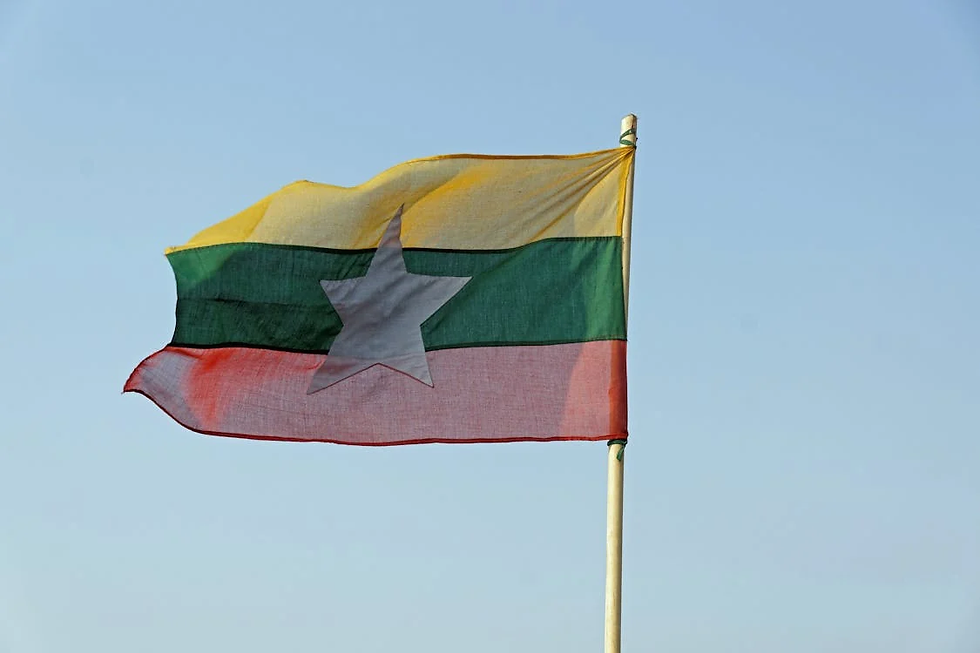Aung San Suu Kyi Faces Two Years in Jail, Further Sentences Likely
- Hannah McGaw

- Dec 9, 2021
- 3 min read
Updated: Dec 23, 2024
On the 6th of December, Myanmar’s previous de facto leader, Aung San Suu Kyi, was convicted on one charge of incitement to cause public alarm, and another of flouting restrictions implemented because of the pandemic when she waved to supporters while wearing a mask and face shield. Win Myint, the former president of Myanmar, was sentenced to four years in prison under the same charges.
Suu Kyi was initially sentenced to four years of detainment. Yet, just hours after the decision was announced, state media declared that her sentence had been reduced by two years. It is, however, likely that she will ultimately receive a significantly longer sentence. Suu Kyi currently faces eleven charges - the maximum sentences of which add up to more than a century. The BBC notes that it remains unclear whether Suu Kyi will be placed in prison; she is currently being held at an undisclosed location.

Suu Kyi, 76, has been held in detention since the military coup which overthrew her elected civilian government on February 1st 2021. According to The Atlantic, the first charge against her stems from an unsigned letter issued by the National League of Democracy party in the days following the coup. This letter was widely shared on social media and encouraged the citizens of Myanmar not to cooperate with the junta (the military government). Beyond this, Reuters reports that she is accused of a wider series of offences, including bribery, possessing illegal two-way radios, and incitement to commit violence against the state. Her legal team has rejected all of these allegations.
The head of her legal team, Khin Maung Zaw, claims that the evidence, such as the aforementioned letter, used against Suu Kyi is inadmissible as they were not signed by Suu Kyi or her co-defendants (Win Myint and former Naypyitaw mayor Myo Aung). “There is no sign on the documents. They extracted the document from [the] Internet,” Khin Maung Zaw told Reuters, “They didn't include how they extracted the documents, what tech they used to extract the documents...they just submitted it at court. That's the reason we objected.”
In an article published on Tuesday, The Guardian described Aung San Suu Kyi and Win Myint as “hostages, not criminals”. In an interview with Russian news agency Sputnik earlier this week, the coup leader (General Min Aung Hlaing) said: “I am not a judge. I cannot say what will happen. I cannot give any orders on what to do with her.”
Describing the coup as “politically motivated”, The Conversation writes that the verdict and the sentencing have been heavily criticised by many international organisations, such as the UN and the EU. Michelle Bachelet, the UN Human Rights chief, has condemned the “sham trial”, claiming that the treatment of Suu Kyi would only “deepen rejection of the coup”.
Similarly, international rights group Amnesty called the charges "bogus", claiming that the ruling was the "latest example of the military's determination to eliminate all opposition and suffocate freedoms in Myanmar".
Hours after Suu Kyi was sentenced, protesters took to the streets in Yangon, the capital of Myanmar, as well as elsewhere throughout the country, to denounce military rule. FRANCE 24 records that many protesters held three fingers aloft: a symbol that has long been considered a pro-democracy salute, signifying that the movement has evolved from having a sole leader to being a country-wide resistance.
The executive director of the Burma Human Rights Network told FRANCE 24: "The protest is not about Aung San Suu Kyi being arrested or being in jail. It's for the people. Every day people are giving their life for their country and for change."
Suu Kyi is due in court again on the 14th of December, when she will face charges of possessing illegal walkie-talkies.

_edited.png)

Comments